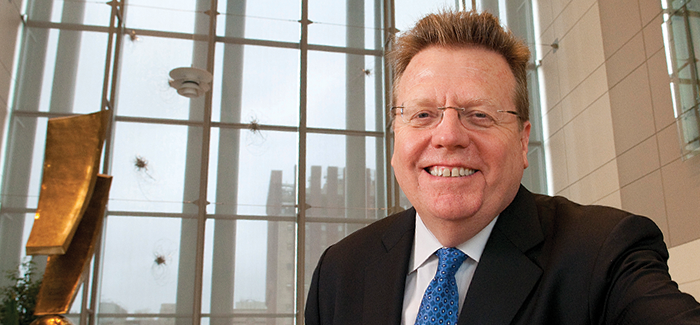
(Photography by Lloyd Degrane)
Matthew Tirrell, Pritzker director of the Institute for Molecular Engineering, discusses the partnership between UChicago and Ben-Gurion University to make fresh drinking water cheaper and more plentiful.
Earlier this summer in Jerusalem, I joined my friend and scientific collaborator, Moshe Gottlieb, the Frankel professor of chemical engineering at Ben-Gurion University of the Negev (BGU) in Be’er Sheva, Israel, to announce formal cooperation on clean water innovation between UChicago and BGU. The announcement featured President Robert J. Zimmer and his counterpart at BGU, Rivka Carmi, as well as Chicago mayor Rahm Emanuel and the president of Israel, Shimon Peres.
The event was exceptional in several respects. It took place at President Peres’s official residence, and it was widely covered by Israeli news media. More unusual still, it brought together a group of researchers who live and work in a desert, in a country that gets about 60 percent of its fresh water by desalination from the ocean, with another group of engineering scientists from halfway around the world who live by one of the world’s great freshwater reservoirs.
That dramatic contrast, and the complementarity between our two groups, is part of what makes this collaboration stimulating for all of us. BGU has leading researchers and facilities for nanotechnology, as well as pilot-scale facilities for water purification as part of the Zuckerberg Institute for Water Research. At UChicago’s Institute for Molecular Engineering (IME), we are well along in assembling a unique team of experts, including current and new faculty, focused on the molecular-level science and engineering of water. We have a lot to learn from one another, and a host of new questions to examine. For example, when freshwater supplies were abundant, brackish groundwater was nothing more than a futuristic prospective resource. Today it has become one of the most important elements of the conversation about how to meet water needs.
The announcement marked my third trip to Israel in six months to develop this partnership, matched by several visits from BGU to Chicago. In April, 17 of us from UChicago and Argonne visited BGU and spent a couple of days brainstorming with our Israeli counterparts. In my experience, this is the most exciting type of collaboration. Many scientific partnerships involve the execution of research, in which one is pursuing a certain line and gets to a point where one needs help in measuring, calculating, or interpreting something. That happens often in great universities. What is rare and exciting is when researchers get together on conception of research ideas.
Our time together in April led to a set of 15 joint proposals that we are now screening to select the highest priority ideas for seed funding; more promising ideas have been generated than we will be able to pursue initially. We have new ideas to develop specialized purification membranes, to prolong the life of membrane materials, to create new catalysts for eliminating industrial contaminants, for tools for groundwater conservation, and many more. Each one is being advanced by a team consisting of a BGU researcher in concert with a UChicago or Argonne researcher.
IME’s partnership with Argonne is vital to this project, not only for the technical expertise Argonne scientists bring to the table, but also because of the inseparable connection between global water and energy usage. It takes energy to create clean water, and it takes a lot of water to produce energy. Much of the water involved in energy production can be reclaimed but it must be cleaned up. The energy consumption for desalination can be as much as ten times higher than for water from local freshwater supplies. Smart grids for water are likely to follow smart grids for energy.
There is no doubt that by 2020, desalination and water purification technologies, as well as more effective uses of water in energy production and agriculture, will contribute significantly to ensuring a safe, sustainable, affordable, and adequate water supply for our nation and the world. Our partnerships with BGU and with Argonne go to the heart of our commitment at IME to tackle technological problems of global importance. To accomplish this, we are building a faculty of outstanding achievement and diverse expertise. They, in turn, are reaching out to their peers around the world to develop partnerships that leverage this growing body of talent to address large-scale issues that matter to all of us.
